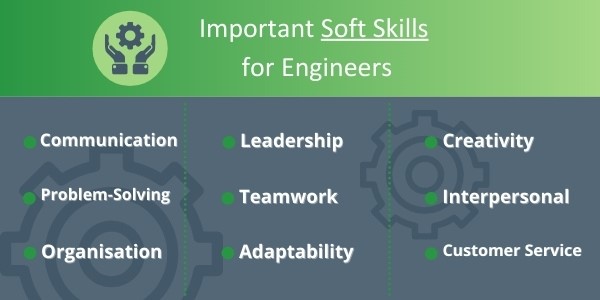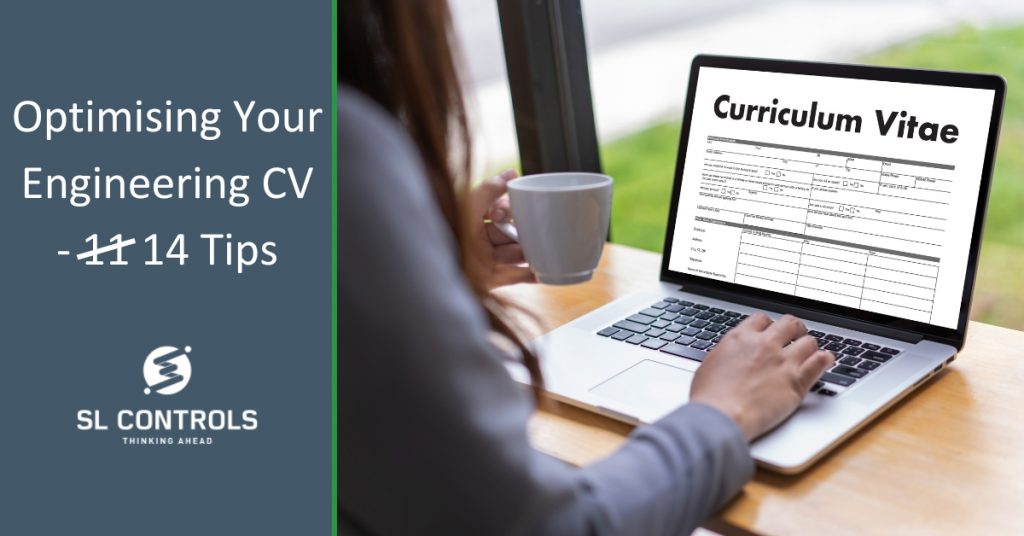Writing a compelling CV will help you land the ideal engineering job – one that pays well, challenges you, presents opportunities for career progression, and strikes the right work-life balance. How do you write a great engineering CV, though? Here are our (updated) 14 tips:
1. Make It Relevant
Tailor your CV to the job you are applying for as engineering roles are varied, even within disciplines. By tailoring your CV, you can show you have knowledge of the industry as well as highlighting specific skills and experience that will be beneficial to the role.
Tailoring your engineering CV could be something as simple as re-arranging the information to make certain points more visible. For example, if you are applying for a Control Systems Engineer position, you should make sure you give weight to your control systems experience. Also, you could replace part of your summary at the top of the CV with points that are control systems specific.
2. Research the Company
It is difficult to make your CV relevant if you don’t first research the company you are applying to. Look at the types of jobs they are recruiting for, the projects they have worked on, and the services they offer. Blog sections and mentions of the company in the press can also give you a good insight into its priorities and areas of focus. Also, if you know someone who already works in the company, talk to them.
3. Ensure It Is Easy for Recruiters to Read
Your engineering CV should be as easy to read as possible. The aim is to ensure recruiters reading your CV can quickly and easily identify the most important information.
So, state your engineering skills and experience explicitly. You can do this by highlighting projects you’ve worked on, responsibilities you’ve had, and tasks you’ve performed.
It is also important to get the layout right, with sections clearly labelled with headings.
4. Focus on the Most Important Points First
Focus a lot of your efforts on the beginning part of the CV as first impressions count. This is the section before your work and education history, where you highlight your main skills and experience, creating a short profile.
You can go into more detail later in the CV but make sure you list the most important and relevant points in this section. For example, you should include points tailored to the role you are applying for.
5. Use Relevant Engineering Words and Phrases
You should include engineering skills keywords in your engineering CV. You can do this in a list or throughout the content as you describe roles and achievements. Below are examples of the types of keywords you should include:
- Your technical skills
- Your software skills
- Programming languages you know
- Your hardware knowledge
- Your systems knowledge
- Processes you have experience with
- Frameworks you have experience with
- Compliance experience
Highlighting your industry experience through the words you use is also important, especially if the job prefers or requires specific experience.
6. Prove Your Skills
Following on from the last point, don’t just list your software and technical skills. It is also beneficial to explain how you have used those skills. The aim is to prove your competency. You won’t have space to do this with all the skills you have, so focus on those that are most important to the role you are applying for.
7. Include Achievements
Staying in the same topic area as the previous two points – remember that responsibilities are important, but achievements are crucial. Also, achievements provide evidence for your skills and knowledge. After all, it is easy to create a list of all the things you can do. The more impactful information will be evidence of how you have used your knowledge and skills. Therefore, focus on achievements as much as possible.
8. Highlight Your Soft Skills
Focusing on achievements will also highlight your interpersonal skills. This includes things like communication skills, leadership abilities, and teamwork skills. These are known as soft skills, and they are different from the hard skills you have as an engineer.
Don’t underestimate the importance of soft skills. Interpersonal skills, in particular, let the potential employer visualise the roles and duties you can perform, not just the technical capabilities you have.

One final consideration with this point concerns working from home. In this post-Covid-19 era, many engineering roles potentially have a work-from-home element. Mentioning your capabilities in this regard can be beneficial. For example, highlighting time management skills and your ability to work on your own initiative.
9. Add Some Personality
Adding personality to your engineering CV will make it stand out from the rest and help to grab the attention of recruiters. Adding personality is not as easy as listing your qualifications and experience, so here are some tips:
- The cover letter that accompanies your CV is a great place to add some personality to your application.
- Talk about what you are passionate about professionally. What motivates and inspires you in the industry?
- Showing enthusiasm and passion for interests outside of work is also helpful. So, instead of listing some outside interests, explain why one or two of them are important to you.
- Don’t be overly formal in your cover letter. It needs to be professional, but it should be written in the first person with a conversational tone, and you shouldn’t be afraid to be yourself.
- Avoid business jargon as much as possible in your CV and especially in your cover letter.
10. Keep It Concise
Your CV should include detail, but make sure you write succinctly. It is important you strike the right balance between presenting an accurate picture of your experience and capabilities while not going overboard.
The more concise and comprehensive you can make the CV, the better. If you stray into a third page, you probably need to cut back a bit to two pages.
If you need to cut your CV back, the first thing you should look for is repetition. Anything you have said before can probably be removed.
Photos are also unnecessary, and they take up space, so they can be removed too.
11. Include a Project Page
If you have experience on multiple projects over several years, you may find it difficult to include everything important in two pages.
In this situation, you should include the main and most recent projects on your CV and then add a third additional page that contains a project list. This list should have the name of the project, the employer/client, and a brief, one-sentence summary/description of what you did, including the outcomes that were achieved.
12. Replace Paragraphs of Text with Bullet Points
Use bullet points instead of paragraphs as much as possible, as bullet-point lists are easier to read.
13. Include Non-Engineering Achievements
Include your achievements and experience outside engineering. This is particularly important if you are a new graduate without much engineering work experience.
Volunteer work, sporting achievements, or participation in community organisations can help the employer better understand who you are.
14. Check, Check, and Check Again
Check for and remove all mistakes. Of course, mistake-free CVs are necessary for all types of jobs, but the nature of engineering work makes it even more important that you pay attention to the details and check for errors. This means proofreading the CV.
After you proofread it, you should then get someone else to proofread it again to spot mistakes you may have missed.
Another proofreading technique is to leave the CV for a few hours before you proofread it again. Also, temporarily changing the text’s font to something completely different can help you spot mistakes you may have missed.
Keeping Your Engineering CV Up to Date
Your engineering CV is about selling you as a professional engineer. It should be a fluid document that you amend and customise for each role you apply for.






Comments are closed.